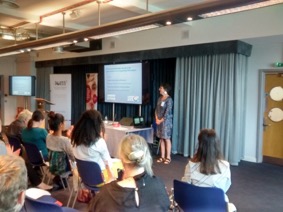It gives me a great pleasure to bring you this guest blog from Dr Gearey who shares with us her experience of returning to STEMM research and her contribution to the International Women in Engineering Day.
Tara Dean, Pro Vice Chancellor Research & Enterprise
‘I can think of no better way to have celebrated ‘International Women in Engineering day’ on June 23rd than in the company of some of the UK’s most prestig ious female scientists, researchers and practitioners, who are the leading lights of their discipline. Coming together to discuss career development within Engineering, and throughout the Sciences, from post-degree to senior management, I was an invited speaker at this one-day seminar held at the Institute of Materials, Minerals and Mining’s (IOM3) head office in London. As a Research Fellow within the University of Brighton’s School of Environment and Technology, I shared my experiences of returning to STEMM (Science, Technology, Engineering, Mathematics and Medicine) research in 2015 following a career break of several years. The all-women panel lead a series of discussions around how best to support gender equality within the workplace, particularly for those trying to balance working life and parenting commitments, and how to progress to a senior level in your chosen field.
ious female scientists, researchers and practitioners, who are the leading lights of their discipline. Coming together to discuss career development within Engineering, and throughout the Sciences, from post-degree to senior management, I was an invited speaker at this one-day seminar held at the Institute of Materials, Minerals and Mining’s (IOM3) head office in London. As a Research Fellow within the University of Brighton’s School of Environment and Technology, I shared my experiences of returning to STEMM (Science, Technology, Engineering, Mathematics and Medicine) research in 2015 following a career break of several years. The all-women panel lead a series of discussions around how best to support gender equality within the workplace, particularly for those trying to balance working life and parenting commitments, and how to progress to a senior level in your chosen field.
My return to academia was enabled through the support of SET colleagues Professor Neil Ravenscroft and Dr Paul Gilchrist and initially championed by Dr Kemi Adeyeye, who heads the Water Efficiency Network (watefnetwork.co.uk), who mentored me and was the person who encouraged me to apply for a Daphne Jackson Trust Fellowship. The Daphne Jackson Trust provides STEMM scientists and researchers with career retraining Fellowships after a break of 2 years or more taken for family, health or caring reasons. I was fortunate enough to be awarded a Fellowship in January 2015 to undertake a two year, part-time research project exploring community resilience to changing water environments along the River Adur in West Sussex, and I’m now working on the NERC funded WetlandLIFE project.
My talk outlined the process of successfully securing a Daphne Ja ckson Fellowship, to encourage those wishing to return to STEMM research, or practitioners wanting to return to academia from industry, to apply. I outlined the benefits of the Fellowship’s personalised retraining package both to the Fellow and their home institution, and highlighted the ways in which organisations looking to welcome experienced STEMM researchers, particularly female returners, and those thinking about developing their own research hubs, would benefit from sponsoring a Research Fellow.
ckson Fellowship, to encourage those wishing to return to STEMM research, or practitioners wanting to return to academia from industry, to apply. I outlined the benefits of the Fellowship’s personalised retraining package both to the Fellow and their home institution, and highlighted the ways in which organisations looking to welcome experienced STEMM researchers, particularly female returners, and those thinking about developing their own research hubs, would benefit from sponsoring a Research Fellow.
Experienced researchers taking a career break find it almost impossible to return to academia after two or more years away. For those of us involved in STEMM research, developments in technology and best practice change so rapidly that many are concerned that if they decide to raise a family, or to take a career break for other reasons, they will never recover professionally. Through the support of my colleagues in SET and the University of Brighton, together with the Daphne Jackson Trust, I’ve shown it is possible to develop a work-life balance and restart a STEMM career.
Joining me as fellow presenters were Professor Serena Best from the University of Cambridge and Dr Artemis Stamboulis from the University of Birmingham, who shared their experiences of navigating STEMM academic careers with parenting. Professor Best highlighted the importance of working within academic institutions which recognize and support the need for flexible working in order to retain highly skilled and committed staff, whilst Dr Stamboulis outlined the benefits of international collaboration in helping organisations benchmark approaches which support equality in the workplace. It was a great honour to be part of this prestigious panel and a welcome opportunity to celebrate the great work of both the Daphne Jackson Trust and the University of Brighton in championing returning STEMM researchers.’
Dr Mary Gearey

